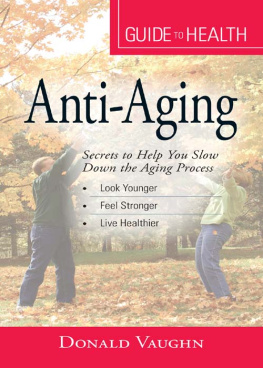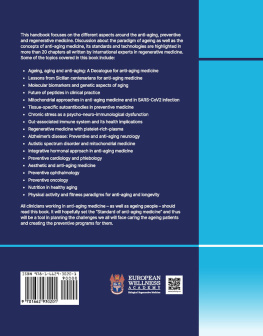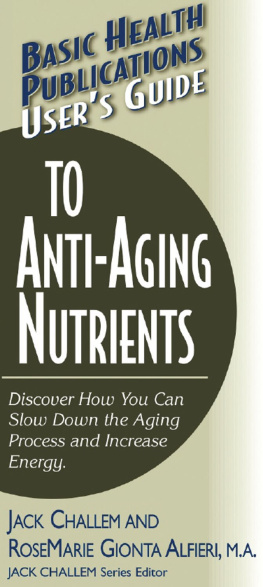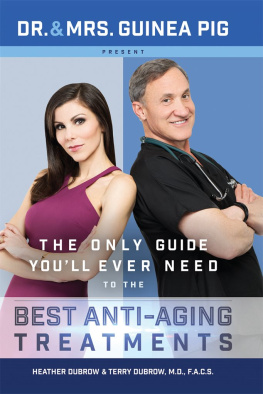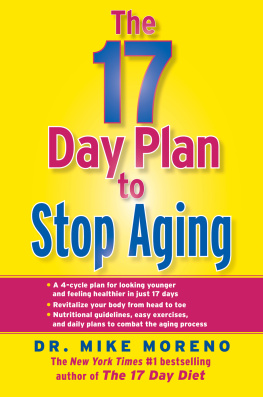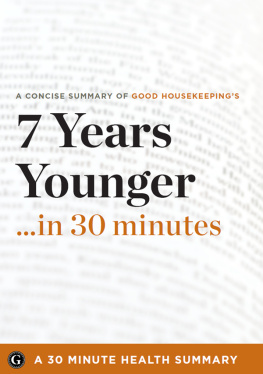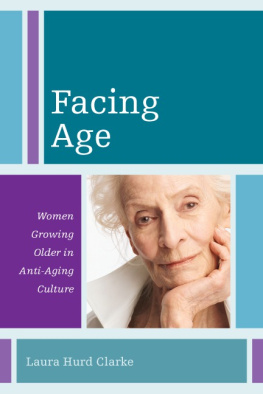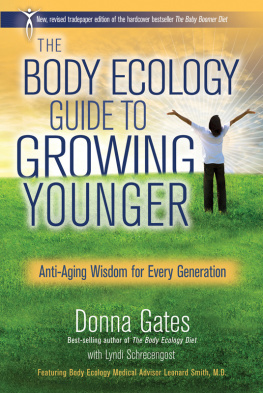For all of us, aging is an inevitable part of life. However, the thought of us aging shouldnt make us cringe. If we take a proactive approach to developing an anti-aging regimen grounded in nutrition, exercise, and healthful living, we can embrace our later years as some of the best years of our lives. We dont have to wait fur future science to slow the aging processtheres plenty we can do right now to hedge our bet against Father Time.
How well we age, and ultimately, how long we live have as much, if not more, to do with the many lifestyle choices we make every day as with our genetic background, risk of chronic illness, or any number of uncontrollable factors. Bottom line: It really is possible to age well if youre willing to work at it.
Chapter 1
Starting Out Right
Benjamin Franklin noted that
the only certainties in life are
death and taxes. Most doctors
would probably agree that
old Ben was wrong; a third
certainty faces us alland that
is aging. Indeed, aging is an
inescapable part of being alive.
From conception to death,
the aging process slowly,
perniciously affects our bodies
and our minds. You can fight it
but you cant stop it.
The Quest for Immortality
For most of us, the realization that were growing older doesnt really sink in until the first sign of gray hair and wrinkles. Only then do thoughts of our own mortality become increasingly common.
Age plays a vital role in the development of disease. Though infection and a handful of childhood disorders are more common in young people, most degenerative diseases afflict people over forty. This includes Alzheimers disease, most forms of cancer, osteoporosis, heart disease, non-insulin-dependent diabetes, stroke, and osteoarthritis. These and many other diseases are triggered by advancing agewhich is one of the most important reasons for researchers to strive to better understand the aging process.
Until very recently, there wasnt much we could do to hold at bay the aging process aside from exercise and a healthy diet. Over the past two decades, however, researchers have made astounding advances in their understanding of aging and what can be done to slow it down. Researchers know more now than ever before about the importance of proper nutrition; replacement body parts are being successfully grown in the laboratory; and the international Human Genome Project promises to help eliminate or cure a wide variety of conditions that in the past cut life short, or made growing older a painful burden.
Prehistoric people were lucky if they lived to be twenty; however, children born today, researchers say, can expect to live well into their seventies, eighties, and beyond in relatively good health.
And what will the future hold? The prospects are unbelievable. Some futurists believe that if science continues its current pace, man will one day live 130, 140, even 150 years. At the moment, 120 years is considered the absolute limit of human longevity. Its impossible, scientists say, for the human machine to function longer than that, no matter how healthful our lifestyle. But in the minds of many age specialists, a 120-year lifespan is a barrier that can and will be broken.
Current and future breakthroughs in the science of aging promise to raise some moral and ethical questions. Would we want to live to 150? What quality of life could people expect? What burdens would this place on society in regard to health care, population, and so forth? What are the emotional and psychological implications of extreme longevity? Where do we draw the line? In theory, nutrition supplementation, gene therapy, laboratory organ growth/natural regeneration, and approaches that are now only in the conceptual stage could one day give us humans capable of living not decades but centuries.
We know that there is no Fountain of Youth, no elixir or pill that will erase the signs and symptoms of age. However, there are many ways to slow the aging process and, in some situations, to reverse it. For example, many of us can extend our life span by making a few lifestyle changes, such as eating less red meat and more vegetables, exercising, and not smoking.
Its important that anti-aging not be approached in a haphazard manner. To age well and stay young, its necessary to formulate an anti-aging regimen that improves every aspect of your physical and mental well-being every day. Tips for such a regimen can be found throughout this book.
Its important that you work with your doctor in formulating and maintaining your anti-aging regimen. No one knows more about your health than your personal physician, and his or her input can go a long way toward creating the game plan that addresses your specific needs and goals.
Throughout this book, well examine how and why the body ages, what factors influence our rate and degree of aging, and what we can do to stay as young as possible for as long as possible. Always remember, however: No matter how long you live, life is still short. Enjoy it while you can.
Working with Your Doctor
Selecting a doctor is one of the most important decisions you can make when it comes to your health. When choosing a doctor, its important that you do your homework and ask questions before making your decision.
Finding Common Ground
One of the most important considerations is how attuned your physician is to you, your needs, and your goals. In addition to your primary health care, its essential that your doctor understand how important it is to you to live as many good years as you possibly can. Many so-called old-school doctors disagree with the holistic approach to medicine and dont value the desire to incorporate health, nutrition, and breaking advances in science and medicine to help you live longer. These physicians prefer instead to treat your problem and send you on your way.

